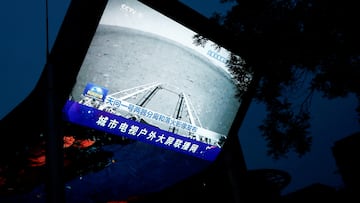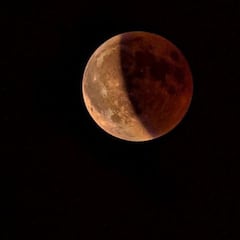China’s Zhurong space rover makes surprising discovery on Mars
New evidence points to the existence of liquid water on the surface of the Red Planet, a major discovery as researcher seek to understand Mars’ history.


A new study published on Wednesday in Science Advances outlines new findings suggesting the presence of water on the surface of Mars in the past.
Data gathered by China’s Zhurong rover, a part of the Tianwen-1 mission, found evidence of water in the Red Planet’s Utopia Planitia basin. The findings came after hydrated sulphate and silica materials were identified.
The Zhurong rover has been conducting a mission on the surface of the northern hemisphere of Mars, where NASA’s Viking 2 rover landed in 1976. The latest Chinese mission is seeking to find evidence of the existence of life on the planet.
Evolution of the design of the Zhurong Mars rover's solar panels [我们的太空] pic.twitter.com/ElNna4PtCy
— Andrew Jones (@AJ_FI) May 11, 2022
What does this tell us about Mars’ past?
It is thought that Mars was once a warm and wet planet before a significant climatic change transformed the planet into an arid desert. The timeframe of the change is thought to have begun with the Amazonian period, roughly three billion years ago, and continues to this day.
Yang Liu, one of the lead authors of the study, said of the findings: “The most significant and novel thing is that we found hydrated minerals at the landing site which stands on the young Amazonian terrain, and these hydrated minerals are (indicators) for the water activities such as (groundwater) activities.”
Researchers also found that brightly hued rocks at the surface have developed a layer of hard crust. This layer, according to the study, could form when water leaves damp soil and turns it into a crust after evaporating.
China's Mars rover #Zhurong is ready for winter on the Red Planet. pic.twitter.com/1DbTLGPxVC
— Hua Chunying 华春莹 (@SpokespersonCHN) May 7, 2022
This layer is known as duricrust and could be a key signal of the presence of water on the surface of Mars in the past. The duricrust is particularly pronounced in Utopia Planitia, suggesting that the area of Mars’ surface had the most active water cycle.
Experts also explained that no river beds or channels of water have been found in the area, suggesting that any water has been gone for long enough to allow the planet’s surface to be sufficiently weathered for any marks to be removed.
What next for Mars exploration?
The astonishing findings exceeded researchers’ expectations of the mission, becoming the first to show the existence of hydrated minerals at the landing site. The use of the rover to explore a far great expanse of Mars’ surface allowed for the discovery and similar projects on Utopia Planitia will become more common.
Related stories
Many scientists have posited that the region may once have been an ocean on the surface of mars, and Yang hopes that the rover could go on to study different layers of a crater to discovery more about the chronology of the Red Planet’s change.
“So the discovery of hydrated minerals (has) significant indications on the geological and water history of the region and the climate evolution of Mars,” he said.

